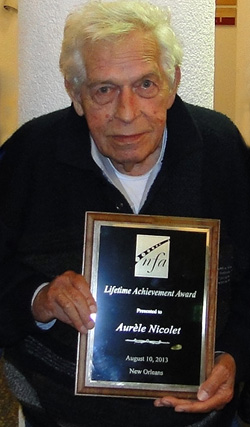Aurèle Nicolet
2013 Lifetime Achievement Award
Aurèle Nicolet was born in Neuchâtel (the French-speaking section of Switzerland). He studied flute with André Jaunet and theory with Willy Burkhard in Zürich and continued his studies with Marcel Moyse (flute) and Yvonne Drappier (theory) in Paris.
In 1947 he graduated from the Conservatoire National de Paris with a Premier Prix du Conservatoire. In 1948, he won the first prize at the international flute competition in Geneva. He was solo flutist at the Tonhalle Orchestra in Zürich (1947–48) and Winterthurer Stadtorchester in Winterthur (1948–50), both in Switzerland. In 1950, Wilhelm Furtwängler called him to Berlin, where Nicolet performed as principal flutist with the Berlin Philharmonic until 1959, for the last couple of years under Herbert von Karajan.
Besides being an excellent and outstanding orchestra musician, Nicolet also has lived a musical life that includes an active chamber and solo career. He loves collaborating and exchanging ideas with other brilliant musicians, including oboist Heinz Holliger, pianist Bruno Canino, and harpsichordist Karl Richter, to name a few. He commissioned composers and premiered many pieces throughout his entire career. Takemitsu, Yun, Denisov, Halffter, Ligeti, Huber, and Holliger were among many others.
In addition, Nicolet was an international flute soloist with the best orchestras across the globe, and his performances are featured on numerous albums and broadcasts. His concerts are remembered as exceptionally musical, colorful, and moving performances. His appearance on stage was simply charismatic.
From 1952 to 1965, he was professor of flute at the Musikhochschule in Berlin, and he then taught as a professor at the Musikhochschule in Freiburg im Breisgau, Germany, until 1981. Aurèle Nicolet also has held masterclasses all over the world and has regularly judged competitions. He loves to collaborate with flutemakers. He has presented his complete music library to former students in China, Qiling Chen and Sanqing Chen in Beijing, where the Aurèle Nicolet Competition for flute takes place. He has influenced, and continues to influence, generations of flutists as a musician, pedagogue, judge, mentor, and human being.

- Convention
- Scholarships & Competitions
- Resources & Publications
- Programs
-
Committees
- About Our Committees
- Committee Webpages
- NFA Committees Blog
- Committee Web Presence Guidelines
- Giving
- About
- Community
- PayPal
- Walfrid Kujala Tributes